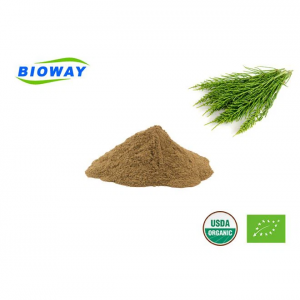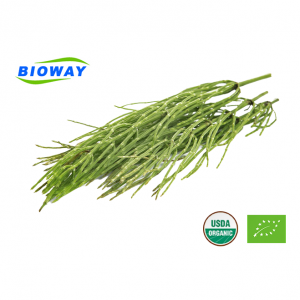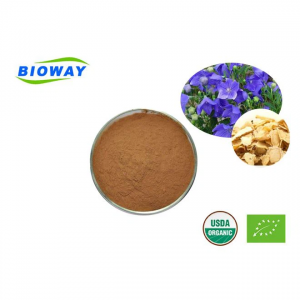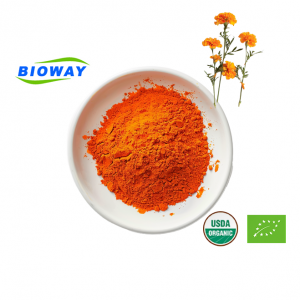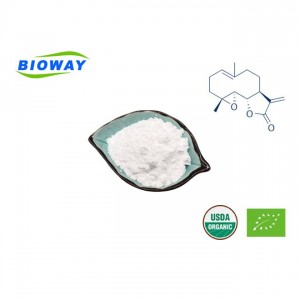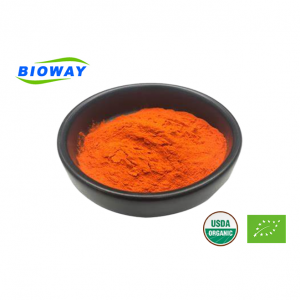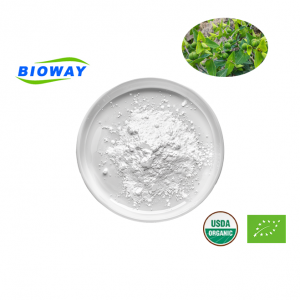Organic Horsetail Extract Powder
Organic horsetail extract powder is a botanical extract derived from the horsetail plant, also known as Equisetum arvense. Horsetail is a perennial plant that has a unique, hollow, and segmented stem. The extract is obtained by grinding and processing the aerial parts of the plant, which include the leaves and stems.
Organic horsetail extract is rich in various bioactive compounds, such as flavonoids, silica, phenolic acids, and minerals. It is often used in natural health supplements and skincare products due to its potential health benefits.
Horsetail extract is believed to have antioxidant, anti-inflammatory, and diuretic properties. It is also known for its high silica content, which plays a crucial role in maintaining healthy skin, hair, and nails. Therefore, organic horsetail extract powder can be used in formulations aimed at promoting healthy skin, supporting hair growth, and improving nail strength.
Additionally, horsetail extract is sometimes used in traditional medicine practices for its potential diuretic effects, which may help support kidney and urinary tract health. However, it is important to note that further scientific research is needed to confirm these potential benefits.
As with any natural supplement or ingredient, it is always recommended to consult with a healthcare professional before using organic horsetail extract powder, especially if you have any underlying health conditions or are taking medications.
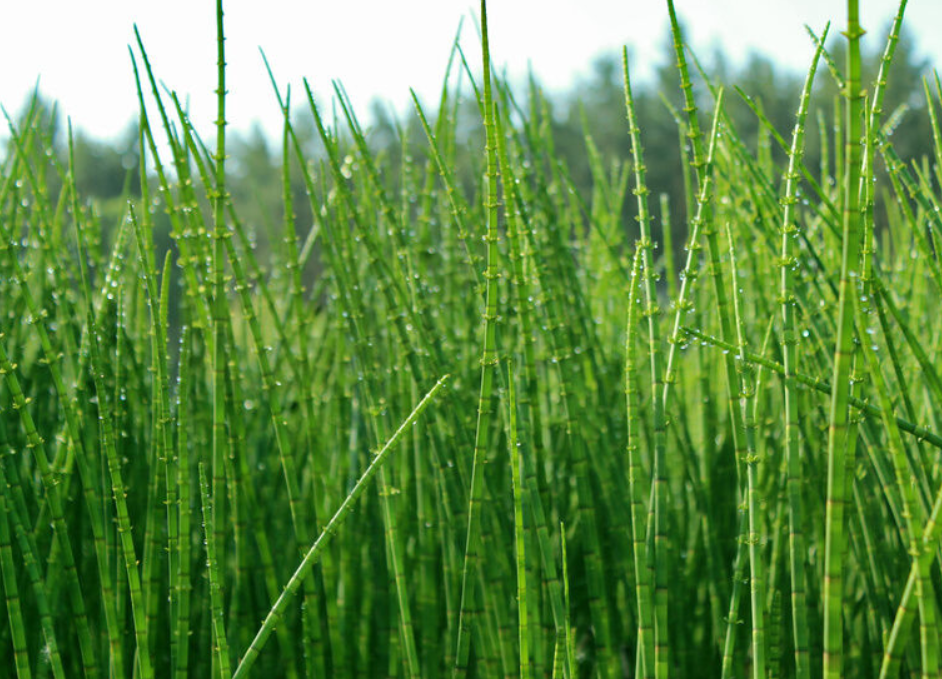
| Item | Specification | Results | Methods |
| Assay (on a dry basis) | Silicon≥ 7% | 7.15% | UV |
| Appearance & Color | Brown yellow powder | Conforms | GB5492-85 |
| Odor & Taste | Characteristic | Conforms | GB5492-85 |
| Part Used | Whole herb | Conforms | / |
| Extract Solvent | Water &Ethanol | Conforms | / |
| Mesh Size | 95% Through 80 Mesh | Conforms | GB5507-85 |
| Bulk Density | 45-55g/100ml | Conforms | ASTM D1895B |
| Moisture | ≤5.0% | 3.20% | GB/T5009.3 |
| Ash Content | ≤5.0% | 2.62% | GB/T5009.4 |
| Heavy Metals | |||
| Total Heavy Metals | ≤10ppm | Conforms | AAS |
| Arsenic (As) | ≤2ppm | Conforms | AAS(GB/T5009.11) |
| Lead (Pb) | ≤2 ppm | Conforms | AAS(GB/T5009.12) |
| Cadmium(Cd) | ≤1ppm | Conforms | AAS(GB/T5009.15) |
| Mercury(Hg) | ≤0.1ppm | Conforms | AAS(GB/T5009.17) |
| Microbiology | |||
| Total Plate Count | ≤10,000cfu/g | Conforms | GB/T4789.2 |
| Total Yeast & Mold | ≤1,000cfu/g | Conforms | GB/T4789.15 |
| E. Coli | Negative in 10g | Conforms | GB/T4789.3 |
| Salmonella | Negative in 25g | Conforms | GB/T4789.4 |
| Staphylococcus | Negative in 25g | Conforms | GB/T4789.10 |
1. Organic Certification: Organic horsetail extract powder is sourced from plants that are grown without the use of synthetic pesticides, herbicides, or fertilizers. Having organic certification ensures that the product meets strict quality standards and appeals to health-conscious consumers who prefer organic ingredients.
2. High-quality Sourcing: Highlighting the quality of the horsetail plants used in the extraction process can be a selling point. Ensuring that the plants are carefully selected and harvested from sustainable and reputable sources adds credibility to the product.
3. Standardized Extraction Process: Using a standardized extraction process helps maintain consistency and ensures that the desired bioactive compounds are present in the final powder. This allows manufacturers to accurately formulate their products and ensures that consumers receive a consistent and effective product.
4. Purity and Potency: Emphasizing the purity and potency of the organic horsetail extract powder can make it stand out in a competitive market. Providing detailed information about the concentration of bioactive compounds, such as silica content, can help customers make informed decisions about using the product in their formulations.
5. Packaging and Documentation: Providing clear and informative packaging, such as labeling the product as organic and including relevant certifications, can help retailers easily identify and promote the product. Additionally, providing comprehensive documentation, such as certificates of analysis and lab testing results, assures customers of the quality and safety of the product.
6. Regulatory Compliance: Ensuring that the organic horsetail extract powder meets relevant regulatory requirements adds an extra layer of trust and credibility. This includes complying with quality standards set by organizations such as the FDA, GMP (Good Manufacturing Practices), and any other applicable regulatory bodies.
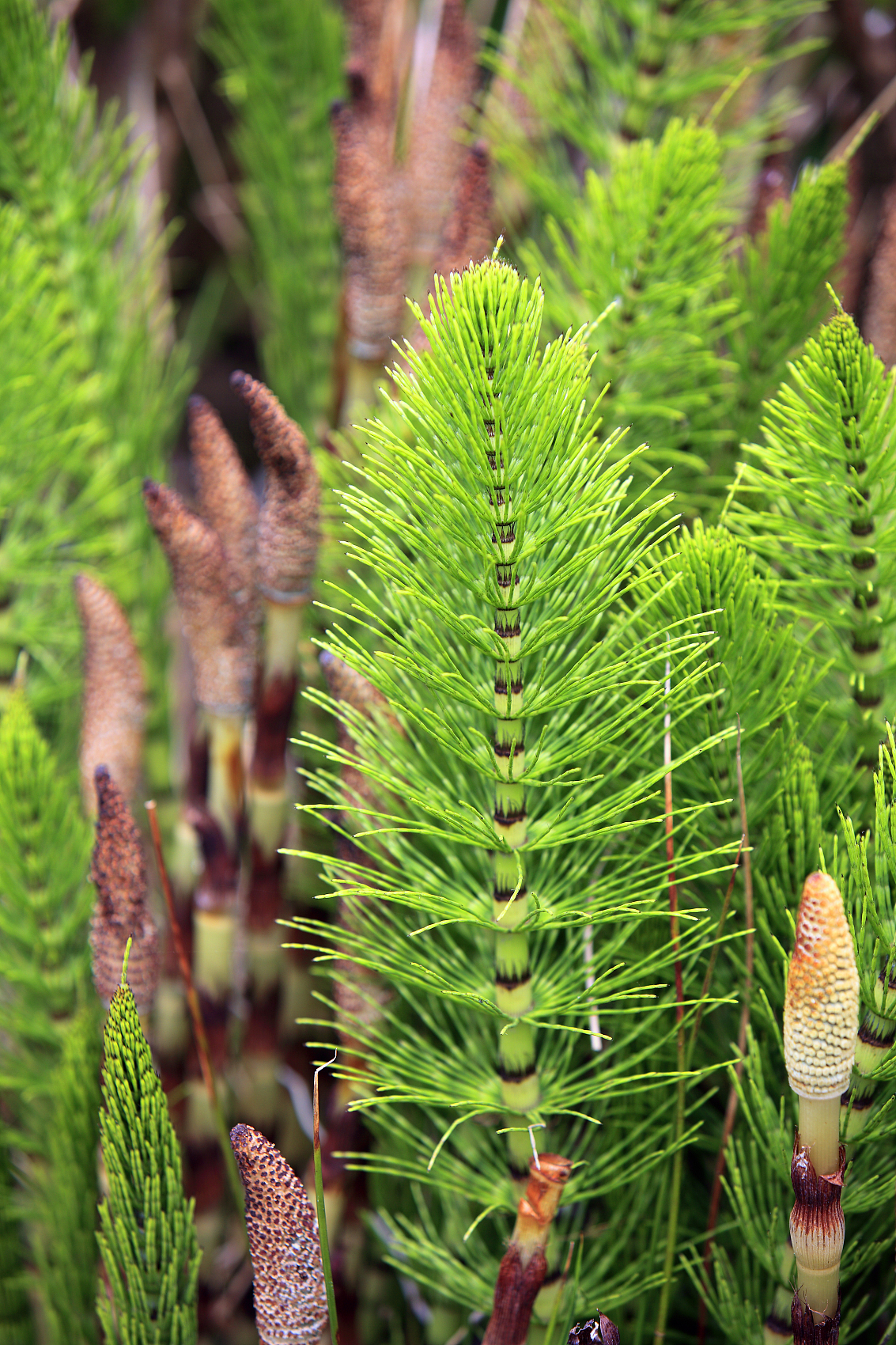
Organic horsetail extract powder offers several potential health benefits, including:
1. Support for Bone Health: Horsetail extract is rich in silica, a mineral that is important for bone health. Silica helps in the absorption and utilization of calcium, contributing to the strength and integrity of bones.
2. Promotes Healthy Hair, Skin, and Nails: The high silica content in horsetail extract supports the growth and maintenance of healthy hair, skin, and nails. Silica is essential for the formation of collagen, a protein that provides strength and elasticity to these tissues.
3. Antioxidant Activity: Horsetail extract contains flavonoids and phenolic compounds, which have antioxidant properties. Antioxidants help protect your body's cells from free radicals, unstable molecules that can damage cells and contribute to chronic diseases.
4. Supports Urinary Tract Health: Horsetail extract has diuretic properties, meaning it may help increase urine production and promote the elimination of waste products from the body. This can potentially support urinary tract health and help flush out toxins.
5. Joint and Connective Tissue Support: Some studies suggest that horsetail extract may have anti-inflammatory properties, which can help reduce inflammation in the joints and support overall joint health. However, more research is needed in this area.
It's important to note that while horsetail extract offers potential health benefits, individual results may vary. It is always advisable to consult with a healthcare professional before incorporating any herbal supplement into your routine, especially if you have a pre-existing medical condition or are taking any medications.
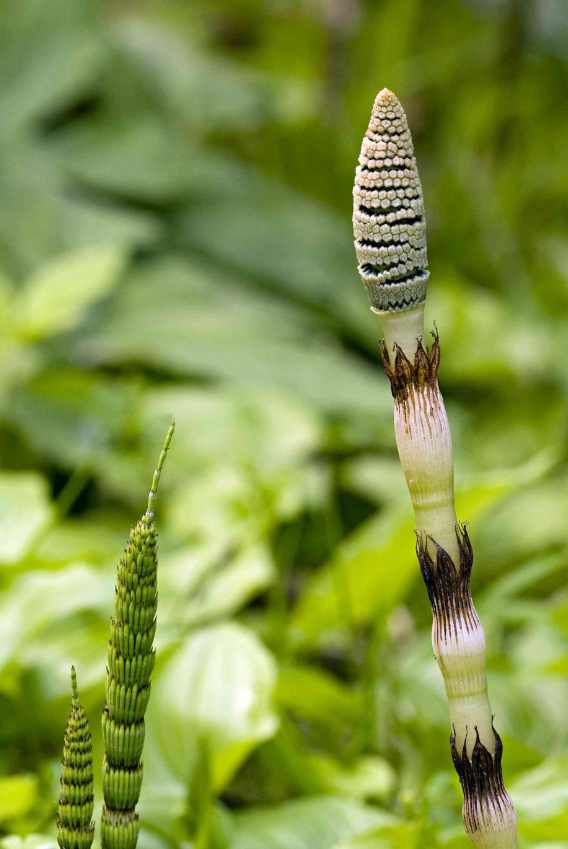
Organic horsetail extract powder has a range of applications in various industries due to its unique properties. Some common application fields include:
1. Dietary Supplements: Organic horsetail extract is a popular ingredient in dietary supplements due to its high silica content and potential health benefits. It can be used in formulations aimed at promoting healthy skin, hair, nails, and bone health. It may also be used in supplements targeted toward kidney and urinary tract health.
2. Skincare Products: Horsetail extract is often used in natural and organic skincare products for its antioxidant and anti-inflammatory properties. It can be incorporated into creams, lotions, serums, and masks to support healthy skin by improving elasticity, reducing signs of aging, and providing hydration.
3. Hair Care Products: The high silica content in horsetail extract makes it beneficial for hair health. It may help strengthen hair follicles, promote hair growth, and improve the overall condition of the hair. It is often used in shampoos, conditioners, and hair serums.
4. Nail Care Products: Horsetail extract's silica content can also benefit nail health by promoting stronger and healthier nails. It is commonly found in nail serums, creams, and treatments.
5. Herbal Medicine: Traditional herbal medicine practices may utilize horsetail extract for its potential diuretic properties. It is believed to support kidney and urinary tract health. However, it is important to consult with a healthcare professional before using horsetail extract for medicinal purposes.
It's important to note that the specific applications and uses of organic horsetail extract powder may vary depending on the product formulation and the intended purpose. Always follow the recommended usage guidelines and consult with experts or professionals in the field for accurate application and dosage recommendations.
Here's a simplified process flow chart for producing organic horsetail extract powder:
1. Harvesting: The horsetail plants are carefully selected and harvested. It is important to ensure that the plant material is organic and free from contaminants.
2. Drying: The freshly harvested horsetail plants are spread out in a well-ventilated area or placed in a drying chamber. They are dried at low temperatures to preserve the active constituents of the plant.
3. Milling: Once the horsetail plants are completely dried, they are processed into a coarse powder using a mill or grinder. This step breaks down the plant material into smaller particles, making it easier to extract the desired compounds.
4. Extraction: The milled horsetail powder is soaked or steeped in a suitable solvent, such as water or ethanol, to extract the beneficial components. This process is typically done using traditional methods like maceration or percolation.
5. Filtration: After the extraction process, the liquid herbal extract is filtered to remove any solid particles or impurities. This step helps ensure the purity and quality of the final product.
6. Concentration: The filtered extract is then concentrated to remove excess solvent and obtain a more potent extract. This can be done through methods such as evaporation or using specialized equipment like rotary evaporators.
7. Drying: The concentrated extract is dried using techniques like freeze-drying or spray-drying. This step transforms the liquid extract into a powdered form, which is easier to handle, store, and consume.
8. Grinding: The dried extract, now in powder form, is further ground to achieve a uniform particle size. This grinding step enhances the solubility and absorption of the powder when consumed.
9. Quality Control: The final horsetail extract powder is tested for various quality parameters, including potency, purity, and absence of contaminants. This ensures that the product meets industry standards and is safe for consumption.
10. Packaging: The organic horsetail extract powder is carefully packaged in suitable containers to protect it from moisture, light, and other environmental factors. Proper labeling is also done to provide important product information to consumers.
11. Storage and Distribution: The packaged horsetail extract powder is stored in a controlled environment to maintain its quality and potency. It is then distributed to various retailers or directly to consumers.
It's important to note that this process flow may vary depending on the manufacturer and specific production methods. Additionally, the use of organic and sustainable practices is crucial to ensure the integrity and purity of the final product.
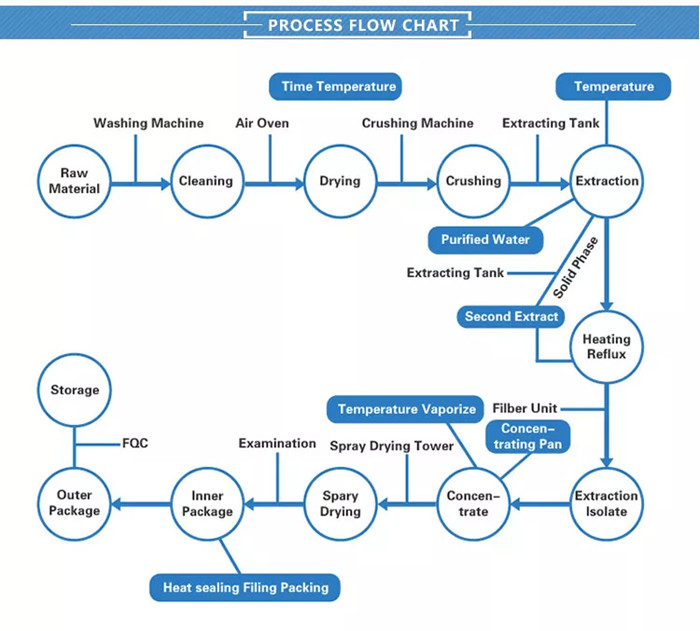
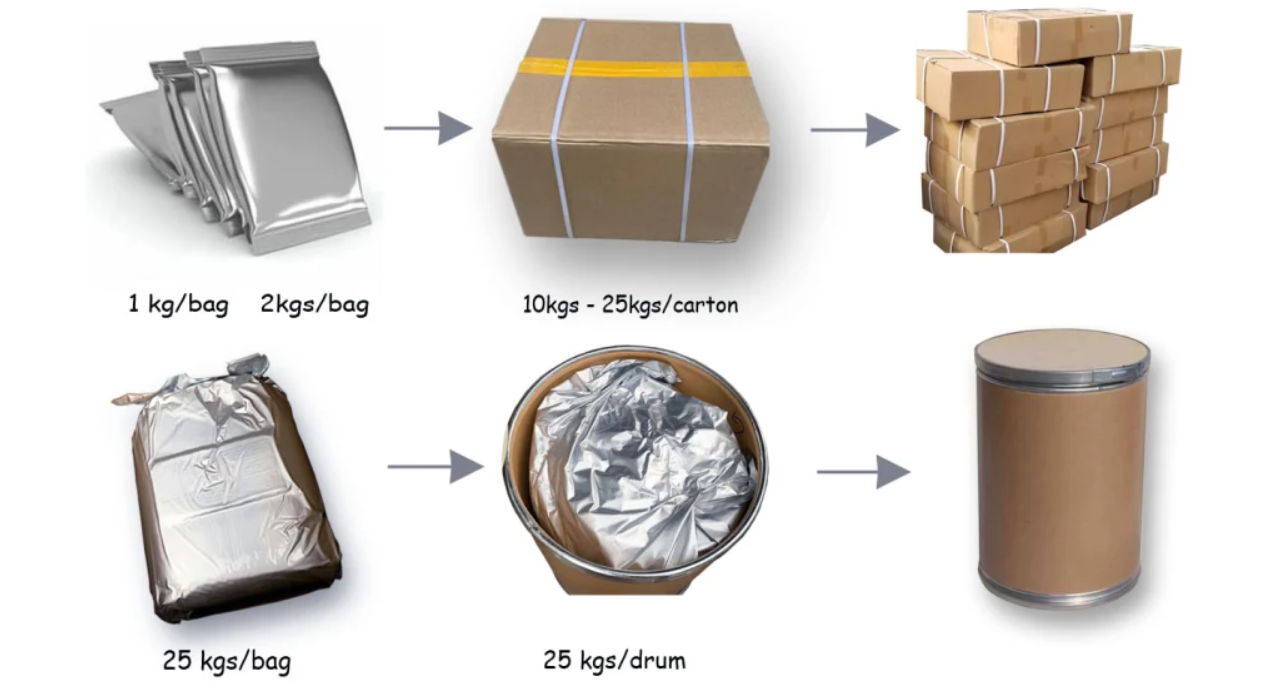
Express
Under 100kg, 3-5Days
Door to door service easy to pick up the goods
By Sea
Over300kg, Around 30 Days
Port to port service professional clearance broker needed
By Air
100kg-1000kg, 5-7Days
Airport to airport service professional clearance broker needed

Organic Horsetail Extract Powder is certified by USDA and EU organic, BRC, ISO, HALAL, KOSHER, and HACCP certificates.

Horsetail extract is generally considered safe when used as directed. However, like any herbal supplement, it can potentially cause side effects in some individuals. Here are some possible side effects of horsetail extract:
1. Diuretic effect: Horsetail extract is known for its diuretic properties, which means it can increase urine production. Although this can be beneficial for individuals with fluid retention issues, excessive diuresis can lead to dehydration if adequate fluid intake is not maintained.
2. Electrolyte imbalance: Due to its diuretic effect, horsetail extract can cause an imbalance in electrolytes, particularly potassium levels. This can be a concern for individuals with existing electrolyte abnormalities or those taking medications that affect electrolyte balance.
3. Thiamin (vitamin B1) deficiency: Horsetail contains a compound called thiaminase, which can break down thiamin. Prolonged or excessive use of horsetail extract may lead to a deficiency in vitamin B1, causing symptoms like weakness, fatigue, and nerve damage.
4. Avoid in certain medical conditions: Individuals with kidney disease or kidney stones should exercise caution when using horsetail extract, as it may exacerbate these conditions. It is advisable to consult with a healthcare professional before starting horsetail extract supplementation in such cases.
5. Allergic reactions: Some individuals may have allergies or sensitivities to horsetail extract. Allergic reactions can manifest as skin rashes, itching, swelling, or difficulty breathing. If you experience any signs of an allergic reaction, discontinue use and seek medical attention.
It is worth emphasizing that these side effects are relatively rare, and most people can tolerate horsetail extract without any negative effects. However, it is always advisable to consult with a healthcare professional before starting any new supplement, especially if you have underlying medical conditions or are taking other medications. They can provide personalized advice based on your specific circumstances.
Horsetail extract, derived from the horsetail plant (Equisetum arvense), has been used for centuries for its various potential health benefits. Some of the possible uses and benefits of horsetail extract include:
1. Healthy hair, skin, and nails: Horsetail extract is rich in silica, a mineral that is important for the health and strength of hair, skin, and nails. It is commonly included in hair and skin care products to promote healthy growth and improve their appearance.
2. Bone health: Horsetail extract contains minerals like calcium, manganese, and silica, which are essential for maintaining healthy bones and supporting bone density. It is often included in supplements targeted towards bone health and may have potential use in the prevention and treatment of osteoporosis.
3. Urinary tract health: Horsetail extract is a known diuretic and may help to increase urine production. It has been traditionally used to support urinary tract health, alleviate urinary issues, and promote detoxification.
4. Antioxidant properties: Horsetail extract contains antioxidants, which can help to protect the body against damage from free radicals. This may have potential benefits for overall health and reduce the risk of chronic diseases.
5. Wound healing: Some studies suggest that horsetail extract may have wound-healing properties due to its high silica content. It may help with the regeneration of skin cells and the formation of collagen, which is crucial for wound healing.
It is important to note that while horsetail extract has a long history of traditional use, scientific research on its specific effects and benefits is limited. Further research is needed to fully understand its mechanisms of action and potential applications. It is advisable to consult with a healthcare professional before using horsetail extract as a supplement or for specific health concerns.


